Jolie Davis, a member of the Ngāti Kuri and Te Rarawa tribes, recently participated in the first-ever Rongoā Māori Conference in Rotorua. The two-day event in May, sponsored by ACC, gathered over 450 practitioners and health providers of Rongoā Māori, a traditional Māori healing practice. The goal of the conference was to build relationships and increase understanding of this healing method within New Zealand’s health sector.
Davis, who is part of the ACC expert advisory panel for Rongoā Māori, expressed her excitement about the event. She said it was a great chance for everyone involved to share knowledge, learn from each other, and explore ways to better serve their communities. She hopes the conference will increase awareness and understanding of the benefits of Rongoā Māori and traditional healing.
Davis, who is originally from the Far North and now based in Wellington, manages Manawa Ora. She has noticed a resurgence in traditional Māori healing. Rongoā Māori aims to restore balance and identify the root cause of illness and unwellness. She said more people are showing interest in learning about and accessing Rongoā Māori.
She attributes her passion for Rongoā Māori to her upbringing in a community where it was a normal part of life. She said it was not only used for treating illness or injury but also for maintaining overall wellbeing.
Since June 2020, ACC has offered Rongoā Māori as a recovery option and has included it in over 10,000 claims. Currently, there are 200 practitioners registered with ACC from the Far North to Stewart Island, and 24 organizations or practitioners in Northland offering Rongoā Māori services. Between June 2020 and March 2024, ACC has supported access to Rongoā Māori services for 658 clients in the Northland region.
Davis believes ACC’s support has significantly contributed to the resurgence of Rongoā Māori. She said the number of people seeking their services has quadrupled in the past three years. Over the past four years, ACC has funded more than 77,000 Rongoā Māori sessions, and the number of people requesting access to Rongoā Māori has doubled. She said ACC has played a crucial role in making Rongoā Māori more accessible to their communities and families.





























































